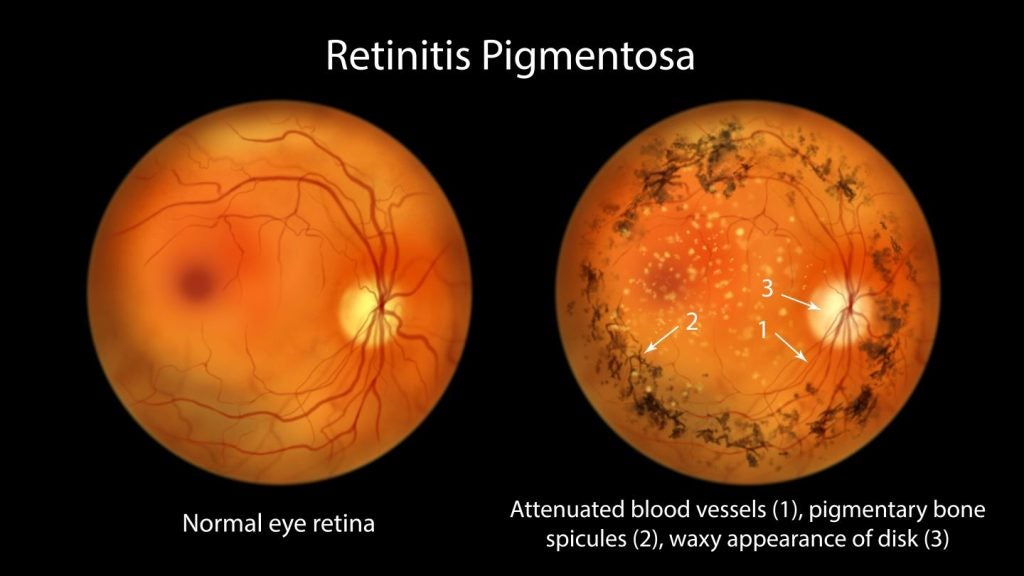On October 20, at the 128th Annual Meeting of the American Academy of Ophthalmology (AAO) 2024 in Chicago, IL, US, two-year data from Nanoscope Therapeutics’ Phase IIb/III trial for its Multi-Characteristic Opsin (MCO-010) (RESTORE; NCT04945772) was presented. This trial investigated the potential of MCO-010 to restore vision in patients with retinitis pigmentosa (RP), an inherited retinal disease (IRD) that affects more than 1.5 million patients globally. Currently, Luxturna (voretigene neparvovec) is the only gene therapy on the market for RP, specifically treating patients with RPE65 gene mutations. MCO-010 has received both FDA fast track designation and FDA orphan drug designation, and according to GlobalData, it offers a competitive advantage over existing and emerging therapies in the RP space due to its novel mechanism of action, which allows it to target a broader range of IRDs.
MCO-010 has garnered significant interest as a gene-agnostic optogenetic therapy with the potential to address all RP genetic variations. Delivered as a single intravitreal injection via adeno-associated virus (AAV2), the MCO transgene is a highly effective opsin that increases the light sensitivity of bipolar cells through using the mGluR6 promoter-enhancer to ensure expression in ON-center bipolar cells, which are stimulated by light, and in turn improve vision in patients who have lost rods and cones.
In RESTORE, patients were randomized on day -3, with their baseline scores recorded and eligibility screened. They received low-dose MCO-010 (0.9 x 1011gc/eye) (n=9), high-dose MCO-010 (1.2 x 1011gc/eye) (n=9), or sham control (n=9) via intravitreal injection. Concurrently, patients were placed on a tapering regimen of oral steroid prophylaxis, receiving 1mg/kg/day from days -3 to 3, 0.5mg/kg/day from days 4 to 10, and 0.25mg/kg/day from days 11 to 17. Inclusion criteria for the trial entailed advanced RP diagnosis, BVCA of 1.9 LogMAR (20/1600) or lower in the study eye, and best-corrected visual acuity (BCVA) of 1.6 LogMAR (20/800) or lower in the fellow eye.
In results presented on October 20 by Dr. Allen C. Ho, MD, Professor of Ophthalmology at Sidney Kimmel Medical College of Thomas Jefferson University, Board Certified in Ophthalmology and a Fellow of the American College of Surgeons and the American Society of Retina Specialists, significant efficacy findings were reported. At week 52, 40% of MCO-010 patients had improvements in BCVA greater than 0.3 units on the LogMAR scale, corresponding to three lines of 15 Early Treatment Diabetic Retinopathy Study (ETDRS) letters, thereby achieving the primary endpoint. At week 76, 56% of MCO-010 patients had improvements in BCVA greater than 0.3 units on the LogMAR scale, with continued gains noted exclusively in the high-dose group, thus fulfilling a key secondary endpoint. By week 126, both the high-dose and low-dose MCO-010 groups
achieved improvements in BCVA of approximately 0.3 units on the LogMAR scale compared to baseline. High-dose MCO-010 achieved statistically significant change in BCVA compared to sham control up until week 88, whereas low-dose MCO-010 achieved statistically significant change in BCVA compared to sham control up until week 64 (p < 0.05). Furthermore, at 100 weeks, the BCVA area under curve (BCVA-AUC) was five times greater in the MCO-010 study arms compared to the sham control arm. As for the safety profile of MCO-010, the treatment was well-tolerated. There were no cases of retinitis, vasculitis, choroiditis, ischemic neuropathy, hypotony, or hypopyon, and no severe adverse events (SAEs) were observed. Consequently, MCO-010 exhibits a highly favorable benefit-to-risk profile.
Key opinion leaders (KOLs) interviewed by GlobalData expressed strong interest in optogenetics, recognizing the significant advancements made in this field for RP. They highlighted its broad application, particularly across the more advanced stages of the disease. However, they also raised questions over the degree of resolution that patients may achieve with optogenetic therapies.
Both primary and secondary endpoints for MCO-010 were met with statistical significance. Patients with retinal neurodegeneration who were legally blind experienced clinically meaningful improvement in vision, and MCO-010’s durability was enhanced by continued improvement in vision over the two-year trial period. Furthermore, MCO-010 had a favorable safety profile, and no SAEs were reported. Nanoscope Therapeutics intends to submit a biological license application in Q1 2025. If approved, MCO-010 has the potential to become highly regarded among both RP patients and clinicians alike, given its promising two-year RESTORE trial results.
According to GlobalData’s Pharma Intelligence Center, there are currently four Phase III candidates, 21 Phase II candidates, and eight Phase I candidates for RP globally.









